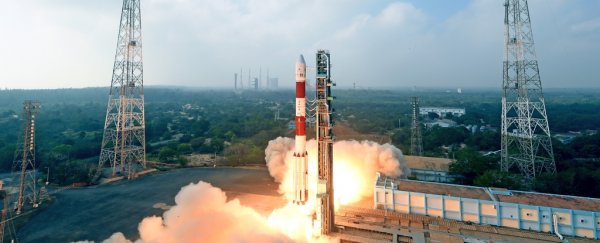Just because you can do something, it doesn't mean you should. In December, a government agency denied the Silicon Valley startup Swarm Technologies a license to send four tiny satellites into orbit - but they are now listed on the manifest of a rocket launched from India in January.
The SpaceBee satellite was intended as the company's technology demonstrator for a space-based Internet-of-Things communications network. It's a minuscule piece of tech, measuring 10 centimetres (4 inches) square by 2.8 centimetres (1.1 inches) high - wherein lies the problem.
According to US Federal Communications Commission (FCC) regulations, laid out in a letter to Swarm Technologies CEO Sara Spangelo on December 12, a satellite must measure at least 10 centimetres on all sides so that it can be detected by the US Space Surveillance Network (SSN). If the SSN can't track it, it poses a collision hazard to other spacecraft in orbit.
As reported by IEEE Spectrum, the four satellites did appear to be aboard the ISRO's Polar Satellite Launch Vehicle (PSLV) on January 12, alongside the main cargo of an Indian weather satellite and dozens of CubeSats from other countries.
The ISRO even noted that the SpaceBees successfully reached Earth orbit the same day - and N2YO, a website dedicated to satellite tracking, shows the SpaceBees in their current orbits, which are almost identical to those laid out by Swarm Technologies' application, IEEE Spectrum notes.
If these reports by the ISRO turn out to be true, it'll be the first time commercial satellites have been launched without authorisation - and Swarm Technologies will be in very hot water.
In fact, the water's heating up already - the company had received authorisation from the FCC to launch four satellites in April, but the FCC has now revoked that authorisation.
"The grant for STA 0026‐EX‐ST‐2018 has been set aside and is now in a pending status for further review," wrote the FCC's Tony Serafini in an email last week to Swarm Technologies.
"The International Bureau requested that the grant be set aside in order to permit assessment of the impact of the applicant's apparent unauthorized launch and operation of four satellites, and related statements and representations, on its qualifications to be a Commission licensee."
Swarm Technologies attempted to mitigate the small size of their first satellites by equipping them with GPS receivers and passive radar reflectors, but the FCC still rejected the application on the grounds that, in the event of a software failure, the satellites would become a piece of noncommunicative debris that could seriously damage other spacecraft.
The company seemed to accept this, and developed a new design in keeping with the FCC's standards, so there are several open questions as to how the satellites got into space.
The biggest one seems to be whether SpaceFlight, the company supplying the satellites to the ISRO, or the ISRO itself, are checking licenses. If they're not, that means other unauthorised satellite launches could easily be made, too.
As for Swarm Technologies, because there is no precedent for this situation, the repercussions if the FCC finds a breach of its rules are currently unknown - but the investigation is underway.
